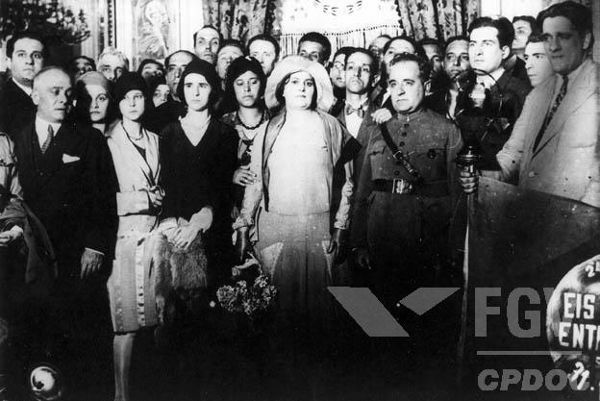Olga Benário Prestes she was a German revolutionary sent to Brazil during the 1930s to ensure the safety of Luís Carlos Prestes on a mission assigned by the Communist International. A committed Communist, Olga was arrested in Brazil and deported to Germany, where she was imprisoned for six years and, being Jewish and for her political position, was executed in the gas chamber in 1942.
Olga Benário's youth
Olga Benário was born on February 12, 1908, in the city of Munich, Germany. She was the daughter of Leo Benario, a wealthy and famous lawyer in Bavaria who spent part of his time helping whoever he could. Her mother was called Eugenie Guttman Benario and was from a wealthy Jewish family.
At age 15, Olga joined a clandestine organization called Group Schwabing, in which she excelled. At age 16, she moved to Berlin with her boyfriend Otto Braun. In that city, she became Secretary of Agitation and Propaganda of the working-class base in the Neukölln district and, shortly thereafter, was promoted to Secretary of Agitation and Propaganda in Berlin.
the acting of Olga in this period in Germany was mainly against the growth of far-right militias – in particular, the Nazis. She became wanted by German justice after rescuing her boyfriend Otto Braun from Moabit prison in April 1928. Because of this, Olga was considered a traitor to the motherland by the German government, which even offered 5,000 marks for information leading to her arrest. She then fled to the Soviet Union in July 1928 |1|.
In Moscow, Olga perfected her knowledge of Marxism and received military training (something she argued was important for a communist since joining the Group Schwabing). In 1934, she received from the Communist International the mission to be responsible for security of Luís Carlos Prestes on the return to Brazil. The Communist International was a section of the Communist Party that determined the bases for the spread of communism internationally.
Luís Carlos Prestes was known in Brazil because of his armed struggle against the troops of the government of Artur Bernardes in the famous About Column from the 1920s. Prestes led a group of about 1,500 men, who marched 25,000 kilometers across Brazil helping the poor and denouncing the Bernardes government, known for its authoritarianism. In 1927, when Prestes' group disarmed in Bolivia, it had not suffered a single defeat.
Historian Anita Leocádia Prestes (who is also Prestes' daughter) states that Olga had already heard stories in Moscow about the feats of Prestes|2|. In the mission received, Olga and Prestes would pass for married and would come clandestinely to Brazil. That's because he was wanted for having deserted the army during the Prestes Column. On the trip, Olga and Prestes fell in love and actually got married.
Communist intent
Luís Carlos Prestes and his coming to Brazil are credited with the mission of organizing a revolutionary movement against the government of Getúlio Vargas. This information is contested by historian Anita Leocádia Prestes. In the country, he was considered honorary president of the National Liberating Alliance (ANL). This political group preached the struggle against fascism and the seizure of power in Brazil by a revolutionary movement.
Do not stop now... There's more after the advertising ;)
In addition, Prestes was part of the staff of the Communist Party of Brazil (PCB). His coming to the country led to an attempted military coup on the left against Vargas at Communist intent. The Communist Intentona took place in November 1935 with military uprisings in three Brazilian cities (Natal, Recife and Rio de Janeiro). The movement, however, failed, and Prestes was pursued by the police.
Olga and Luís Carlos Prestes were arrested in March 1936. Several other Prestes colleagues were also arrested, and many were tortured by the police. In inquiries, Olga refused to cooperate and provide information to the government, which decided to deport her. During her imprisonment, she announced her pregnancy, but was still deported to her home country of Germany. The father of the daughter that Olga was carrying was Luís Carlos Prestes.
Olga's deportation was considered illegal under Brazilian law at the time, as she was pregnant with a Brazilian daughter. Olga Benário's deportation order came from the Federal Superior Court and, on September 23, 1936, she boarded the ship La Coruña bound for Hamburg, Germany. The deportation of Olga was viewed with fear by many, as she was Jewish and, at the time, the clear persecution against Jews that existed in Nazi Germany was already known.
concentration camps
Olga was received by the Gestapo (Nazi secret police) in Hamburg on 18 October 1936. She was transferred to the prison of barminstrasse in Berlin. her daughter, Anita Leocádia Prestes, was born in this city on November 27, 1936. The child was originally sent to an orphanage, however, after international pressure organized by Prestes' mother, the German government gave in and returned Olga's daughter to the family.
Olga, however, remained imprisoned and was transferred several times. She passed through the field of Lichtenburg, later Ravensbruck and finally, Bernburg. In these places, Olga was subjected to cold, hunger, constant interrogation, slave labor and physical torture. Her fate was sealed in April 1942, when, at the Bernburg concentration camp, she was performed in the gas chamber. Olga's fate was only discovered by the family at the end of the Second World War in 1945.
|1| MORALS, Fernando. Olga. São Paulo: Companhia das Letras, 2008, p. 21.
|2|Homage to Olga Benário Prestes, my mother. By Anita Leocádia Prestes.
*Image credits: 360b and Shutterstock
By Daniel Neves
Graduated in History

